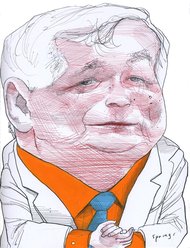After the Smolensk
Crash: "A New Community" of Poland
and Russia?
Adam Michnik
Following
is a special appeal
by Adam Michnik, the editor in chief of the Polish newspaper Gazeta
Wyborcza,
concerning the April 10 plane crash in Smolensk, Russia,
in
which Polish President Lech Kaczyński, his wife, and dozens of senior
members
of the Polish government and military perished. The 94-member Polish
delegation
was coming to celebrate the 70th anniversary of the Katyń massacre, in
which
22,000 Polish military officers were murdered by Soviet security
forces. The
massacre was named after one of the places in which it happened, the forest of Katyń,
close to Smolensk.
For many years, the Soviet leadership assigned blame for this crime to
the
Nazis and, until the recent tragedy, the leaders of post-communist Russia have been reluctant to
acknowledge Russia’s
responsibility for the killings.
—Irena
Gross
Something
touched our hearts.
Four
days after the April 10
tragedy of Smolensk, the Russian
President
declared: “It is obvious that Polish officers were shot at the command
of the
then leaders of the USSR,
including Joseph Stalin.”
The
crime of Katyń has
divided Poles and Russians more than any other event of the twentieth
century.
For the last twenty years in both of our countries an arduous search
continued
for the truth and for the remembrance of that crime of the totalitarian
Stalinist
regime. Right from the beginning, some of the most outstanding Russians
were
involved in this effort. They were statesmen, scientists, civil
servants, and
regular people, and to them many a time Poland expressed her
gratitude and
respect.
The Smolensk
catastrophe broke something in our
Polish and Russian hearts. In the hearts of the leaders and of regular
people.
It was as if a gigantic dam opened—a dam behind which unexpressed words
and
gestures were piled up. In the last days, the entire world learned
about the
Katyń crime. And, in the face of this new tragedy, Russian politicians
decided
to act in an unprecedented way, a way that will remain in history.
The
showing of the film Katyń
by Andrzej Wajda on the most viewed channel of the Russian television;
the
words of President Medvedev about the guilt of Stalin; the earlier
gestures and
words of prime minister Putin – these are the foundation for new
relations
between Poland and Russia. As are all the flowers and lighted candles
on the
site of the Smolensk tragedy, in front of the Polish embassy in Moscow,
and
Polish consular offices in other cities of Russia. And the openness of
the
Russian side in cooperating with the Polish experts in explaining the
reasons
of the catastrophe.
History
has often separated
Poles and Russians. On both sides the hearts were then filled by hatred
and
incomprehension. Common pain, common tears and common mourning are able
to
change it. Even in the most difficult moments of our common history
there were
on both sides people capable of rising above the resentments. In
partitioned Poland,
Adam
Mickiewicz wrote “To Muscovite Friends.” Alexander Herzen felt
compassion for
the Poles suffering under the tsarist yoke. In the twentieth century we
were
joined by the experience of the Gulag, this “inhuman land” about which
Alexander Solzhenitsyn and Gustw Herling-Grudzinski both wrote.
Today,
out of the blood that
was spilled seventy years ago in Katyń and again last Saturday at Smolensk, an
authentic
community of Polish and Russian fates is being born. We thank you,
brother
Muscovites, for your compassion, understanding, spontaneous acts of
solidarity
and all the help linked to this catastrophe.
Every
death hurts and seems
senseless. But from your reaction to the Smolensk
tragedy a good may come for both of our nations, so bitterly marked by
the
past.
April
18, 2010 6:51 p.m.
Lech Kaczyński
Following
is a special appeal
by Adam Michnik, the editor in chief of the Polish newspaper Gazeta
Wyborcza,
concerning the April 10 plane crash in Smolensk, Russia,
in
which Polish President Lech Kaczyński, his wife, and dozens of senior
members
of the Polish government and military perished. The 94-member Polish
delegation
was coming to celebrate the 70th anniversary of the Katyń massacre, in
which
22,000 Polish military officers were murdered by Soviet security
forces. The
massacre was named after one of the places in which it happened, the forest of Katyń,
close to Smolensk.
For many years, the Soviet leadership assigned blame for this crime to
the
Nazis and, until the recent tragedy, the leaders of post-communist Russia have been reluctant to
acknowledge Russia’s
responsibility for the killings.
—Irena Gross
April 18, 2010 6:51 p.m.
Something
touched our hearts.
Four days after the April 10
tragedy of Smolensk, the Russian
President
declared: “It is obvious that Polish officers were shot at the command
of the
then leaders of the USSR,
including Joseph Stalin.”
Bốn
ngày sau thảm kịch 10
Tháng Tư tại Smolensk,
tổng thống Nga phán: "Hiển nhiên là những sĩ quan Ba Lan đã bị bắn vào
sọ,
theo lệnh của cấp trên, trong có ông Trùm Đỏ"
Mít
chúng ta, vào những ngày này,
đếch cần VC phân bua, một triệu tên VC dzui, một triệu tên Ngụy buồn,
đếch cần đám bỏ
chạy ‘nhìn
lại, xét lại...’ mà chỉ cần, chỉ một tên Bắc Kít, dám phán tương tự như
trên!
Hay,
một đấng VC nằm vùng như
HPNT, ‘ân hận’, đã gây ra tội ác Mậu Thân!
Hà, hà!

